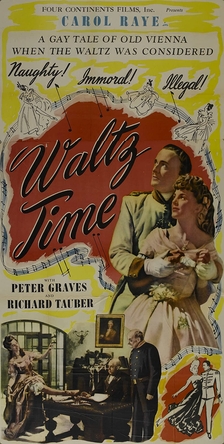Critical
The Monthly Film Bulletin wrote: "This is a light-hearted film in which appear a galaxy of stars. The whole production is on a lavish scale, but with its background of Court scenes and picturesque Vienna it cries out for the use of colour. All the principals are well suited to the parts they play, and the whole thing is garnished with tuneful music, the high-lights of which should be, of course, the songs which Richard Tauber contributes. It must be admitted, however, that the parts in which he appears seem to have been added somewhat as an afterthought. And how it jars to hear the Empress persistently saying 'Lootenant!'" [5]
Variety wrote: "This is a big disappointment. But it goes further than that. This film is proof of British picture makers' ignorance of fundamentals that make a film musical. Production-wise, Waltz Time is terrific. The tunes are okay and mainly adequately sung. Orchestration is top-notch and effectively handled both by visual bands and also background music. But it is no go, mainly because of faulty scripting and direction." [6]
